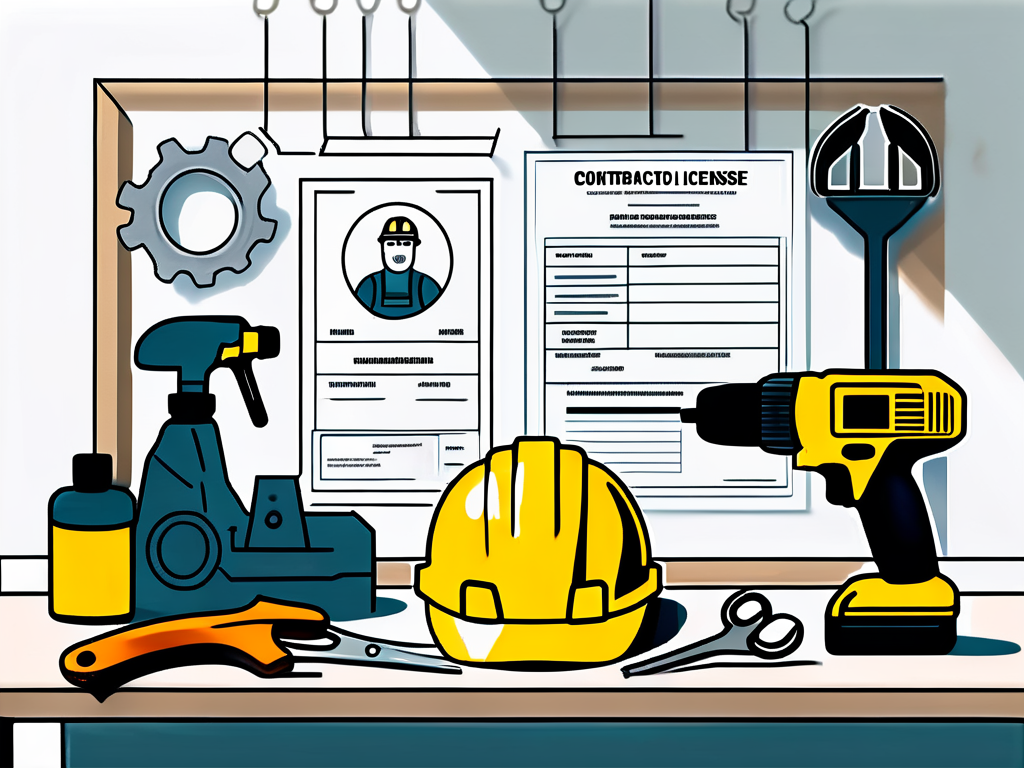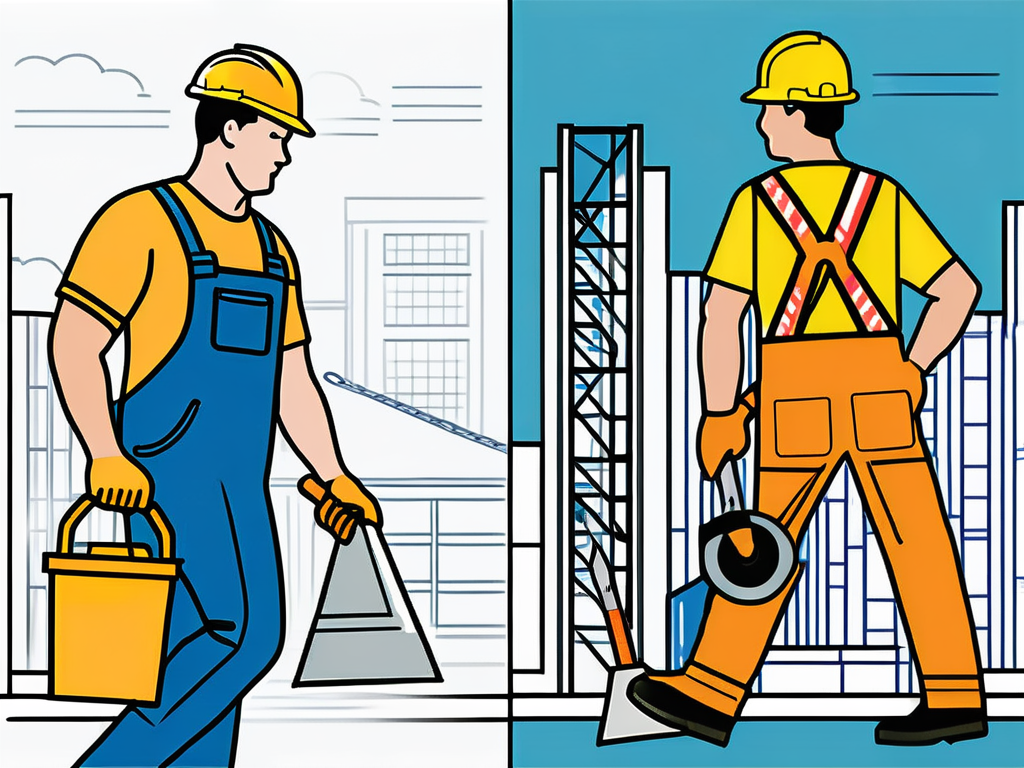Why it’s Important to Hire a Licensed Contractor
When it comes to home improvement projects, hiring a licensed contractor is absolutely crucial. Whether you’re remodeling your kitchen, adding an extension to your home, or simply making repairs, the expertise and experience of a licensed contractor can make all the difference in the success of your project. In this article, we will explore the various reasons why it’s important to hire a licensed contractor, from understanding their role to the potential risks of hiring an unlicensed contractor. We will also delve into the benefits of hiring a licensed contractor and provide tips on how to verify a contractor’s license. Lastly, we will discuss the cost difference between licensed and unlicensed contractors and how it can impact your project in the long run.
Understanding the Role of a Licensed Contractor
Before delving into the importance of hiring a licensed contractor, it’s crucial to understand the role that they play in the construction industry. A licensed contractor is an individual or a company that has met the necessary requirements, such as obtaining the appropriate licenses, permits, and certifications, to legally perform construction work. They have undergone rigorous training and have proven their competency in their respective field.
The Basics of Contractor Licensing
Contractor licensing varies from state to state. Generally, it involves passing a series of exams, demonstrating knowledge of building codes, regulations, and safety procedures. In some cases, contractors may also need to meet specific educational requirements and show proof of insurance or bonds. By obtaining a license, contractors show their commitment to professionalism and adherence to industry standards.
Key Responsibilities of a Licensed Contractor
A licensed contractor has a range of responsibilities to ensure the success of your project. They oversee every aspect of the construction process, including planning, budgeting, scheduling, and managing labor and materials. They also ensure compliance with building codes and regulations, obtain the necessary permits, and maintain a safe working environment for their team and clients. Licensed contractors are held to a higher standard, and their expertise can help avoid costly mistakes or delays.
One important responsibility of a licensed contractor is to effectively communicate with their clients throughout the project. They understand the importance of keeping the client informed about the progress, any challenges that may arise, and any necessary changes to the initial plan. This open line of communication helps build trust and ensures that the client’s vision is being realized.
Another crucial aspect of a licensed contractor’s role is their ability to manage the project’s budget. They have the expertise to accurately estimate costs and allocate resources efficiently. This includes sourcing materials at competitive prices, negotiating with suppliers, and making informed decisions to avoid unnecessary expenses. By carefully managing the budget, licensed contractors help their clients achieve their construction goals within the agreed-upon financial parameters.
The Risks of Hiring an Unlicensed Contractor
While hiring an unlicensed contractor may seem like a cost-saving option, it can lead to numerous legal and safety issues. It’s essential to understand the risks involved to make an informed decision when selecting a contractor for your project.
Before diving into a contract with a contractor, it’s crucial to verify their credentials and ensure they are licensed to perform the work required. Licensed contractors have undergone the necessary training and certification processes, demonstrating their competence and commitment to quality work. By hiring a licensed professional, you can have peace of mind knowing that your project is in capable hands.
Legal Implications
Working with an unlicensed contractor can expose you to significant legal risks. In many jurisdictions, performing contracting work without a license is illegal. If any issues arise during or after the project, such as faulty construction, property damage, or construction defects, you may have limited legal recourse. In some cases, you may even be held liable for hiring an unlicensed contractor, which can result in fines or lawsuits.
Moreover, licensed contractors typically carry insurance coverage to protect both parties in case of accidents or property damage during the project. This insurance provides an added layer of security and ensures that you are not financially responsible for any unforeseen mishaps that may occur on the job site.
Quality and Safety Concerns
When you hire an unlicensed contractor, you are taking a significant gamble on the quality of work and safety standards. Licensed contractors are held to strict guidelines and regulations, ensuring that their work meets industry standards. Unlicensed contractors may lack the necessary knowledge and skills, leading to subpar workmanship, shortcuts, and potential safety hazards.
Furthermore, licensed contractors are required to stay up-to-date with building codes, safety regulations, and industry best practices. This ongoing education and training ensure that licensed professionals are equipped to handle various challenges that may arise during a construction project. By choosing an unlicensed contractor, you risk compromising the structural integrity of your project and potentially putting the safety of occupants at risk.
Benefits of Hiring a Licensed Contractor
Now that we have explored the risks of hiring an unlicensed contractor, let’s shift our focus to the numerous benefits of working with a licensed professional.

Choosing a licensed contractor for your project not o
- Home improvement projects
nly ensures compliance with local building codes and regulations but also provides you with access to a network of trusted professionals. Licensed contractors often have established relationships with suppliers and subcontractors, which can streamline the construction process and potentially save you time and money. By hiring a licensed contractor, you are tapping into a wealth of industry knowledge and resources that can make your project run more smoothly and efficiently.
Assurance of Quality Work
A licensed contractor brings a level of professionalism and expertise to your project. They have undergone extensive training and have a proven track record of delivering high-quality work. With their knowledge and experience, they can provide valuable insights, recommend the best materials and techniques, and ensure that your project is completed to the highest standard.
Furthermore, licensed contractors are held to a higher standard of accountability. They are required to meet certain criteria and maintain their licensure through ongoing education and training. This commitment to excellence translates into a higher level of craftsmanship and attention to detail in their work. By hiring a licensed contractor, you can rest assured that your project will be completed with precision and care.
Protection Against Liability
When you hire a licensed contractor, you gain an added layer of protection against liability. Licensed contractors carry insurance and bonds that protect you from potential damages or accidents that may occur during the course of the project. This peace of mind is invaluable, knowing that you are not financially responsible for any mishaps that may happen on your property.
Additionally, licensed contractors are well-versed in safety protocols and best practices on the job site. They prioritize the well-being of their clients, workers, and the general public by adhering to strict safety guidelines. By entrusting your project to a licensed professional, you are minimizing the risk of accidents and ensuring a secure working environment for everyone involved.
How to Verify a Contractor’s License
Verifying a contractor’s license is an essential step in the hiring process. It allows you to ensure that the contractor is legitimate and has met all the necessary requirements. This verification process is relatively straightforward and offers peace of mind.
Online Verification Tools
Most states have online databases where you can check the status and validity of a contractor’s license. These databases provide information on the contractor’s licensing history, any disciplinary actions, and any complaints filed against them. Simply enter the contractor’s license number or name, and you will be able to access this information instantly.
Questions to Ask a Potential Contractor
In addition to online verification, it’s crucial to ask potential contractors about their license during the hiring process. Request their license number and ask for proof of insurance and bonding. A reputable contractor will have no issues providing this information and should be transparent about their qualifications.
The Cost Difference: Licensed vs Unlicensed Contractors
While it may be tempting to hire an unlicensed contractor due to potentially lower costs, it’s important to consider the long-term financial impact of this decision.

Initial Cost Analysis
Initially, it may seem like hiring an unlicensed contractor is a more cost-effective option. However, when you factor in the potential risks and issues that can arise, the perceived savings can quickly evaporate. Hiring a licensed contractor may require a higher upfront investment, but it can save you money in the long run by avoiding costly mistakes, legal fees, and project delays.
Long-term Financial Impact
Investing in a licensed contractor not only ensures the proper completion of your project but can also increase the value of your property. High-quality workmanship and adherence to building codes can enhance the durability and longevity of your home, saving you money on future repairs and renovations.
In conclusion, hiring a licensed contractor is paramount to the success and safety of your construction project. From understanding their role and responsibilities to recognizing the risks of working with an unlicensed contractor, it’s clear that the benefits of hiring a licensed professional far outweigh the potential drawbacks. By verifying a contractor’s license and considering the long-term financial impact, you can make an informed decision that not only protects your investment but also ensures a smooth and successful construction experience.
































